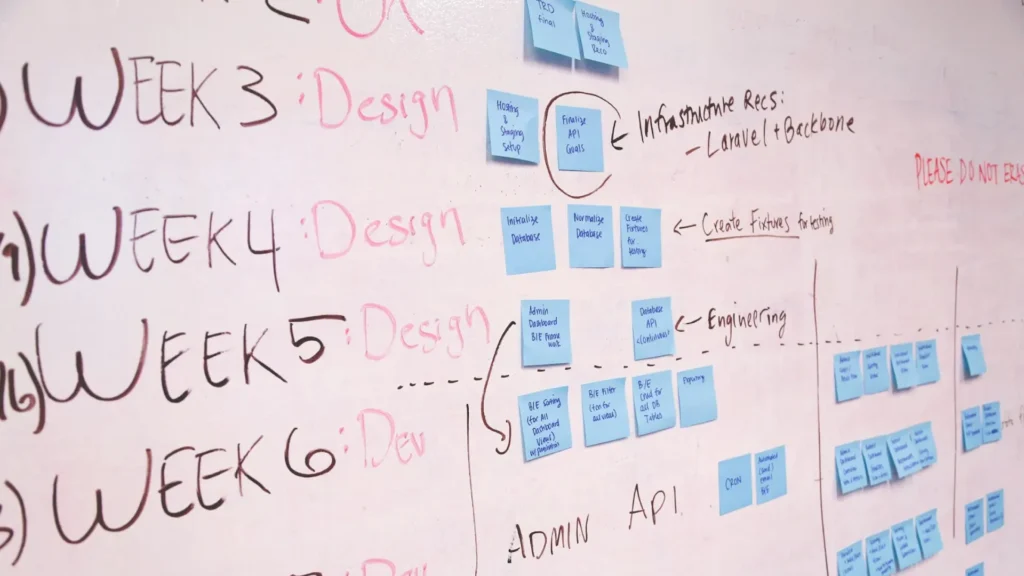Here are 12 cool generative AI examples of how companies are already using the new technology today to change their industry and the entire world of work. You’ll be amazed at what AI can do, from improving processes to creating entirely new business ideas!
Table of contents
1. Intelligent Enterprise Search

Imagine being able to find any information in your company in a flash, whether it’s documents, emails or databases. Generative AI makes it possible! Generative AI search is changing the way companies handle their data. It understands the context of your questions and delivers accurate, appropriate answers.
This technology searches through huge amounts of data in seconds and finds exactly the information you need. This saves a lot of time and makes work easier. Employees can focus on their important tasks instead of spending hours searching for information.
2. AI in the food industry
The food industry is making increasing use of AI to improve processes and develop new ideas. A good example of this is the well-known fruit preparation manufacturer Zentis. The company is using AI in a targeted way to better manage and use its knowledge. This smart knowledge management helps in the development of new products because it can quickly access years of experience
This saves resources and speeds up the development of new products. AI also improves quality control in food production. By using image recognition AI, defects can be detected early, leading to better product quality and increased food safety.
3. AI in development departments

In product development, AI is a real game-changer that is fundamentally changing the way companies invent new things. It helps to implement ideas faster and to identify and solve possible problems early on. Generative AI in development departments supports engineers and designers in difficult tasks. For example, it can make design suggestions, carry out simulations or provide suggestions for improvement
This AI support opens up completely new possibilities for groundbreaking inventions and enables companies to develop products that were previously thought impossible. By automating time-consuming processes, developers can focus on creative and strategic aspects, which leads to a significant increase in productivity and innovative strength.
4. AI in research and development

In research and development, AI is proving to be a real turbo that takes the speed and quality of innovation to a new level. Companies like R-Biopharm are using AI technologies to revolutionise the entire research process and to achieve breakthrough insights faster AI systems can analyse huge amounts of data from scientific publications, patents and research reports in a matter of seconds, identifying connections that human researchers might miss.
This ability to recognise patterns and generate hypotheses not only speeds up the identification of promising research directions, but also opens up completely new perspectives and approaches.
- AI can perform complex simulations that would have taken months or years in the past in hours or days.
- In drug development, AI helps identify potential drug candidates, significantly accelerating the drug development process.
- AI-powered image analysis is revolutionising fields such as medical diagnostics by detecting anomalies in X-rays or MRI scans with high precision.
- In materials research, AI can predict new materials with specific properties, leading to breakthroughs in areas such as renewable energy or battery technology.
The use of AI in research and development not only accelerates the innovation process, but also improves the quality and reliability of research results. Organisations that integrate AI into their R&D processes can significantly increase their competitiveness and bring innovations to market that have the potential to transform entire industries.
5. AI in customer service

Customer service is getting a lot better thanks to AI. Chatbots and virtual assistants are getting smarter and smarter and can now understand and answer complicated customer queries. These AI systems learn from each conversation and get better and better at it. They can not only answer simple questions, but also offer customised solutions and, if necessary, seamlessly hand over to human employees This results in faster and more personalised customer service that is available 24/7.
Customers have to wait less and get more accurate answers, which makes them happier. At the same time, companies can save costs because routine tasks are automated and human employees can focus on more difficult cases. This combination of AI and human expertise creates customer service that is both efficient and empathetic.
6. AI for product development

AI is transforming product development in ways that were unimaginable even recently. This advanced technology is helping developers and designers by creating new designs, improving prototypes and even simulating complicated product lifecycles. By being able to analyse huge amounts of data and develop new ideas from it, AI is not only making the development process much faster, but also cheaper and more efficient. For example, AI can create thousands of design variations in seconds, taking into account things like functionality, appearance and manufacturability.
This enables companies to respond more quickly to market trends and develop innovative products that offer exactly what customers want. It also helps to predict potential problems in the product life cycle, resulting in more robust and sustainable products. This AI-supported approach to product development opens up completely new possibilities for companies to be more innovative and stay ahead of the global competition.
7. Personalized Marketing with AI

AI is transforming marketing by making it possible to personalise advertising much more effectively. This advanced technology analyses vast amounts of customer data, such as browsing behaviour, purchase history and even social media activity, to better understand each individual customer. Based on these insights, AI creates tailored content that is precisely suited to the interests and preferences of each customer.
This means that each customer receives exactly the advertising that is most interesting and relevant to them – whether it’s through personalised emails, dynamic website content or targeted social media ads. This highly personalised approach leads to more customers buying and being more satisfied. Companies can use their marketing budget more efficiently because they can target their messages more accurately and have less wastage. What’s more, AI also enables predictive marketing, in which future customer needs can be predicted and proactively addressed. This revolution in personalised marketing not only creates stronger customer relationships, but also sustainably increases sales and customer loyalty.
8. AI in process optimisation
Large companies like Siemens Energy are using AI to improve their complex business processes and make them more efficient. This advanced technology constantly analyses huge amounts of data from different areas of the company, finding patterns, bottlenecks and opportunities for improvement that humans often overlook. For example, AI systems can monitor production processes in real time, predict when maintenance is needed and optimise the allocation of resources. They can run through complicated scenarios and predict the effects of different decisions, leading to better and data-based decisions.
At Siemens Energy, the use of AI in process optimisation has led to great results: production times have been shortened, energy efficiency increased and quality control improved. Furthermore, AI enables predictive maintenance of equipment, which reduces unplanned downtime and increases overall equipment efficiency These AI-based process optimisations not only lead to significant time and cost savings, but also to more sustainable and resource-efficient production. Companies like Siemens Energy are impressively demonstrating how AI is becoming a driver of efficiency, innovation and competitiveness in modern industry.
9. AI in financial analysis

In the complex and fast-paced world of finance, AI is proving to be a real game-changer, fundamentally changing the way companies make financial decisions. AI systems can analyse huge amounts of data from a wide range of sources in a matter of seconds – from market data and company reports to news and social media trends. This comprehensive data analysis makes it possible to identify patterns and trends that are often invisible to humans and to make accurate predictions based on them. In the area of investment management, financial institutions use AI algorithms to optimise portfolios and adjust investment strategies in real time.
In risk management, AI-based systems help to identify potential risks at an early stage and develop countermeasures. AI is also revolutionising lending processes by enabling a more accurate assessment of creditworthiness, taking many different factors into account. This AI-based financial analysis leads to more informed and objective decisions, reduces human error and enables companies to react more quickly to market changes. This not only helps companies to better manage their financial risks, but also to identify and take advantage of new business opportunities.
10. AI in the automotive industry
The automotive industry is undergoing major changes due to the use of AI, and this goes far beyond self-driving cars. Companies like ADAC are using AI technologies to develop innovative solutions that make mobility safer, more efficient and more environmentally friendly. In vehicle development, AI helps to simulate and improve complicated systems, resulting in more efficient and environmentally friendly powertrains. AI algorithms analyse huge amounts of vehicle data in real time to detect potential problems early and enable predictive maintenance. This not only reduces downtime but also increases the safety and reliability of vehicles.
In the area of road safety, the ADAC relies on AI-based systems for accident prevention and analysis. These systems can predict dangerous situations on the road and warn drivers in time. AI is also changing the way customers interact with the automotive industry. Chatbots and virtual assistants offer personalised advice on selecting and configuring vehicles, while AI-supported analysis systems evaluate customer behaviour to offer tailored services and products. The integration of AI in the automotive industry is not only leading to technical innovations, but is also fundamentally changing the way we understand and experience mobility. It paves the way for smarter, safer and more environmentally friendly transport systems of the future.
11. AI in logistics and supply chains
The logistics industry is experiencing a real revolution through the use of AI, leading to unprecedented efficiency and flexibility in supply chains. AI systems improve complex logistics processes in a variety of ways: they calculate the most efficient routes, taking into account many factors such as traffic, weather conditions and delivery times in real time. This not only saves costs, but also significantly reduces CO2 emissions. In warehousing, AI enables accurate demand forecasting based on analysing historical data, current market trends and even seasonal factors. This allows companies to optimally manage their inventory levels, avoiding overstocking while minimising supply shortages.
AI-driven robots and self-driving vehicles are revolutionising intralogistics by moving and sorting goods faster and more efficiently. When it comes to order fulfilment, AI algorithms intelligently prioritise and bundle orders, resulting in shorter lead times and higher customer satisfaction. AI also enables predictive maintenance of logistics equipment, minimising unplanned downtime and maximising uptime. This AI-driven change not only makes supply chains more efficient and cost-effective, but also significantly more robust and adaptable to unexpected events. Companies can thus react faster and more flexibly to market changes and customer demands, which is a decisive competitive advantage in today’s globalised economy.
12. Image search and recognition
Pictures often say more than words, and with AI in image search and recognition, it gets even better. Advanced AI-powered image search is changing how companies handle images. This technology can automatically recognise and categorise content, objects, colours and even feelings in images. This means you no longer have to scroll through endless folders to find the right image. Instead, you can simply describe what you are looking for and the AI will find it for you.
This not only saves a great deal of time sorting and finding images, but also opens up new possibilities in areas such as marketing, design and product development. Companies can make better use of their images, respond more quickly to trends and improve their visual communication.
